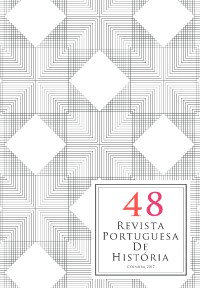Please use this identifier to cite or link to this item:
https://hdl.handle.net/10316.2/93625| Title: | Sobre a utilidade da teoria na historiografia: mobilidade de conceitos e história comparada dos regimes políticos no século XX | Other Titles: | On the usefulness of theory in historiography: the mobility of concepts and compared history of 20th century political regimes | Authors: | Nunes, João Paulo Avelãs | Keywords: | Theoretical concepts;Science;Technology;Political regimes;Compared history.;Conceitos teóricos;Ciência;Tecnologia;Regimes políticos;História comparada | Issue Date: | 2017 | Publisher: | Imprensa da Universidade de Coimbra | Abstract: | Procurando contrariar uma tendência
de hostilidade ao debate teórico que, em
parte, marcaria a historiografia em geral e
a historiografia portuguesa em particular,
reflete‑se,
neste texto, sobre o modo como
os paradigmas epistemológicos vigentes ao
longo da época contemporânea influenciaram
as diversas correntes historiográficas; acerca
das características da historiografia enquanto
ciência e das características das tecnologias
derivadas da historiografia; sobre as vantagens
de se utilizarem conceitos teóricos, quer para
interpretar a evolução da regionalidade política
em Portugal e no Brasil ao longo do século XX,
quer para comparar essas duas com outras
experiências históricas nacionais. Quanto aos fenómenos políticos propriamente
ditos, defende‑se
a operatividade de uma
tipologia de regimes – das monarquias absolutas
de direito divino e carácter corporativo
às
democracias – que permitirá abarcar o essencial
das realidades empíricas ocorridas ao longo da
época contemporânea, tanto em Portugal e no
Brasil (na Europa do Sul e na América Latina
em geral), como à escala global. Evocam‑se,
ainda, categorias teóricas potenciadoras da
análise, por um lado, dos níveis de privação
de direitos de participação política efetiva
tendo em conta critérios de natureza étnica e/
ou religiosa; por outro, do modo como foram
sendo configurados os sistemas de relações
internacionais nos quais Portugal e o Brasil
estiveram ou estão integrados. Seeking to run counter the hostility trend against the theoretical discussion that would, in part, mark historiography in general and Portuguese historiography in particular, the present paper addresses how the epistemological paradigms existing in the contemporary era influenced different historiographic currents; the characteristics of hi s tor iogr aphy a s a s c i enc e and that of the technologies derived from historiography; the advantages of using theoretical concepts, either to interpret the development of political regionality in Portugal and Brazil in the 20th century, or to compare the two with other national historical experiences. As for political phenomena itself, it is argued that the operability of a typology of regimes – from absolute monarchies of divine right and corporate character to democracies – which will make it possible to address the empirical realities in the contemporary era in Portugal and Brazil (in Southern Europe and Latin America overall), and on a global scale. We also evoke theoretical categories that enhance, on the one hand, the analysis of the levels of deprivation of rights of effective political participation taking into account ethnic and/ or religious criteria; on the other hand, how the international relations systems in which Portugal and Brazil were or are integrated are being configured. |
URI: | https://hdl.handle.net/10316.2/43249 | ISSN: | 2183-3796 (digital) 0870-4147 |
DOI: | 10.14195/0870-4147_48_13 | Rights: | open access |
| Appears in Collections: | Revista Portuguesa de História |
Files in This Item:
| File | Description | Size | Format | |
|---|---|---|---|---|
| sobre_a_utilidade_da_teoria_na_historiografia.pdf | 556.85 kB | Adobe PDF |  |
Items in DSpace are protected by copyright, with all rights reserved, unless otherwise indicated.
